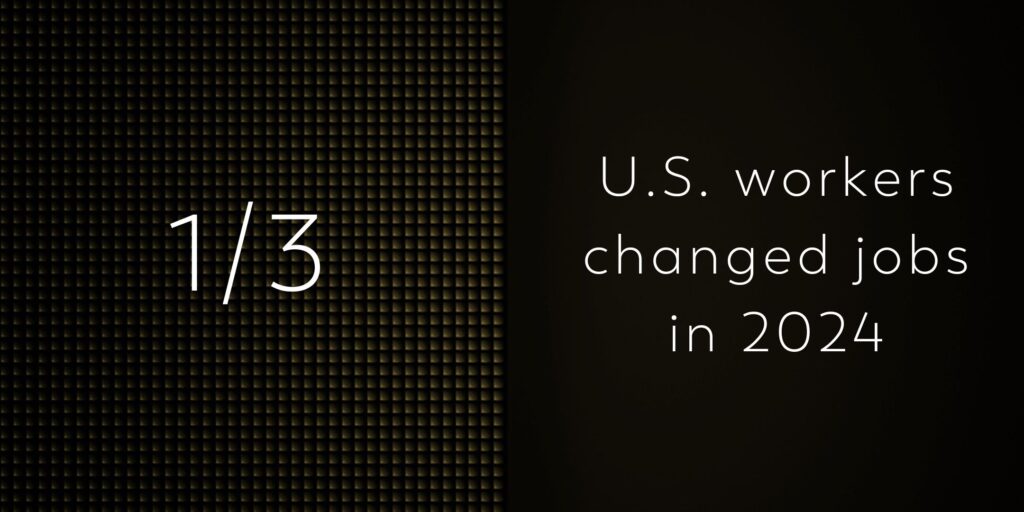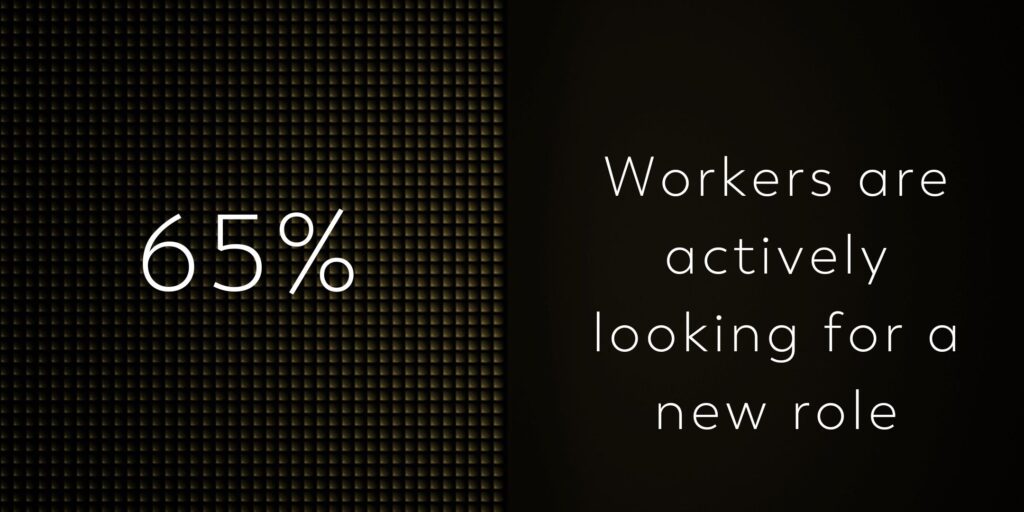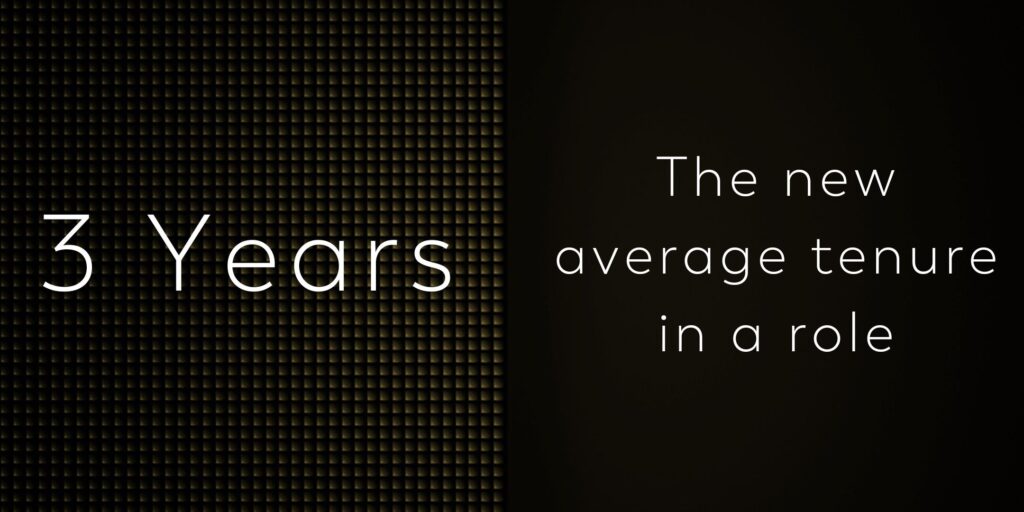The U.S. job market in 2025 is in the midst of a significant transformation, shaped by recovery, reinvention, and ongoing uncertainty.
While the dust has settled somewhat since the pandemic, the landscape of work, recruitment, and career expectations has changed drastically. Employees now view their roles and work-life balance through a different lens, with priorities that reflect the lessons learned from the past few years.
For employees, it’s no longer just about a paycheck. They seek flexibility, purpose, and well-being — and want employers who recognize their value beyond just their output. Work-life balance, remote or hybrid work options, and mental health support are high on their lists, as is the desire for meaningful work that aligns with their personal values.
For employers, many are shifting back to the way they did business pre-pandemic. While they recognize the need to offer some level of flexibility, many are grappling with how to balance employee demands with business goals. We’ve seen many large companies like Amazon, JPMorgan, AT&T implement return-to-office mandates.
A Job Market in Flux
It’s no surprise then that one of the most significant trends we are seeing is the level of job mobility. In 2024, 1 in 3 U.S. workers changed jobs, a clear indication that employees are actively exploring new opportunities. Workers are no longer staying in roles just for the sake of stability. They’re seeking positions that align with their values, provide room for career growth, and offer better work-life balance. This level of movement is reshaping how companies approach hiring and retention.

We’re hearing a lot of research stating that between 56-65% of workers are actively seeking a new job. This fluid job market, alongside the rise of fractional work, means that companies must remain agile and proactive in their recruitment efforts. We are seeing a significant uptick in hiring – moving at a very fast pace compared to last year.

Confidence in the Job Market: A Double-Edged Sword
While job seekers feel empowered to make moves, job confidence is as low as it was during the pandemic. This paradoxical shift — high confidence paired with low overall job satisfaction — stems from economic uncertainty, inflation, and global instability, all of which contribute to a sense of unease, even as employees feel more capable of finding new opportunities. While they feel they have choices, many employees remain wary about long-term job security and the stability of their current employer, especially as news about layoffs continue.
The Rise of Leadership and Hiring Activity
Leadership hiring is seeing strong demand across industries, with organizations prioritizing candidates who can manage through change, foster innovation, and maintain a sense of direction. Leadership is not only about strategy — it’s about navigating a workforce that is increasingly remote, hybrid, and dispersed, making it more essential than ever to have the right leadership in place.
The Trend of Top-Grading: A Strategy for the Future
Another trend we are seeing emerge in 2025 is the rise of top-grading, where companies focus on retaining high-performing employees and letting go of those who aren’t meeting expectations. This isn’t a new strategy, but it is making news with companies like Meta and Microsoft announcing layoffs. We are seeing this happen at many local companies too.
This means, hiring managers are going to have a harder time sifting through applications to find top talent and the right fit for their company.
Early Hiring: The Key to Staying Ahead
With the current job market moving quickly, early hiring has become a critical strategy for companies. The best talent is often snapped up well before a job posting even goes live, and those companies who wait too long to start their recruitment efforts risk losing out on high-quality candidates. In 2025, proactive recruitment is key: If you’re not engaging with candidates early on, they could be securing their next role before you’ve even had a chance to post the opening. And if you are interviewing, make decisions quickly. Good talent is getting hired and we’re seeing many hiring managers miss out on their favorite candidates because they waited too long to make an offer.
Companies that begin hiring early and actively engage with passive candidates are better positioned to attract top talent, especially in areas like leadership and specialized marketing roles. It’s important to anticipate your hiring needs and act on them before competition for top candidates heats up.
The Evolving Tenure: Shorter Stays and Changing Roles
Another shift we’re seeing is a dramatic decrease in employee tenure. The average tenure has dropped to just over three years. Employees are increasingly moving from job to job, searching for more opportunities that align with their needs and aspirations. This fluidity is a challenge for companies, especially as many businesses are returning to pre-pandemic practices, such as rigid in-office policies, which might not be aligned with employee expectations for flexibility.

With tenure shortening, companies need to constantly reassess whether they have the right fit on their teams. The key question is: How can we retain our best talent? Good people aren’t sticking around as long, and if your company is returning to traditional work models without offering flexibility or growth opportunities, you could see increased turnover. Talented employees know they have options and will likely leave if their needs are unmet.
Marketing Roles in 2025: Expanding, Contracting, or Evolving?
In 2025, marketing roles are seeing both expansion and contraction, depending on the industry. Some marketing teams are growing, particularly in digital marketing, data analytics, and customer experience roles. With more companies focusing on personalized marketing, digital transformation, and customer-centric strategies, these areas are seeing increased demand for skilled professionals.
However, some marketing teams are facing layoffs, especially in industries where companies are tightening their budgets or reducing overhead costs. Companies that were previously focused on heavy marketing spends, such as in the tech or e-commerce sectors, are reassessing their marketing strategies in response to economic pressures, leading to some downsizing. While businesses that are investing in growth are looking to expand their marketing teams, often seeking talent with expertise in digital media, content creation, and customer data analysis. Have you assessed your team needs?
For marketing professionals, this means there’s a blend of opportunities — with certain specialized skills in high demand, especially as companies focus on more strategic, ROI-driven marketing initiatives. Top talent is staying competitive by evolving their skills, staying on top of emerging trends like AI-driven marketing, and adapting to the changing needs of employers. These employees are the ones employers are seeking and will have plenty of options to move.
Looking Ahead in 2025: What’s Next?
Several key trends will continue to shape the job market as we move through 2025:
- Fractional Work Will Increase: More companies are hiring fractional employees or part-time specialists to fill critical roles without the long-term commitment. These fractional employees, often experts in their fields, can provide specialized skills on a temporary or project basis, giving companies more flexibility in how they staff their teams.
- Remote Work Remains a Priority: Despite some companies returning to in-office mandates, the majority of employees still prioritize flexible, hybrid, or remote work options. Companies that continue to offer flexibility will be better positioned to attract top talent.
- Technology Will Play a Bigger Role in Hiring: With AI becoming more embedded in recruitment processes, companies will rely on these tools to streamline hiring and ensure they’re identifying the best-fit candidates more efficiently.
- Upskilling and Reskilling Will Be Critical: As industries and job functions evolve, employees will need to continually upskill or reskill to remain competitive. Employers who invest in employee development will attract and retain top talent.
- Employee Experience Will Be Crucial: Companies will need to prioritize creating an exceptional employee experience to differentiate themselves in a competitive talent market. This includes a focus on culture, work-life balance, and career growth opportunities.
Need Recruiting Help for Your Creative and Marketing Roles?
If you’re feeling the pressure of the evolving job market and need support finding the right talent for your creative or marketing roles, True Talent Group is here to help. We specialize in connecting companies with candidates who are not only excited about the role but also align with your culture and are committed for the long term.
What sets us apart is our deep commitment to finding the right fit — many of the candidates we’ve placed are still with our clients five years later, and those who’ve been promoted tend to stay even longer. This speaks to our ability to find candidates who thrive in your company’s environment and bring long-term value.
In addition to recruitment, we can help you assess your current team structure, identify skill and talent gaps, and provide guidance on building a team that can meet the challenges of 2025. Whether you’re expanding your marketing department, filling leadership roles, or strengthening your creative team, we’re here to help ensure you have the right people in place for success.
As the talent landscape continues to shift, True Talent Group is your strategic partner in navigating these changes, ensuring you stay ahead of the curve, and helping you build the team that will drive your company’s success in the years to come.

